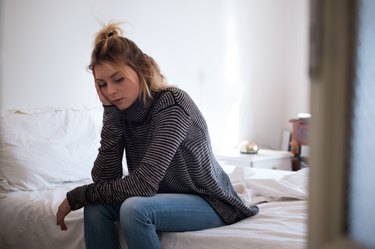
Deciding when to exercise after you've had stomach flu symptoms can depend on a few factors including the severity of the illness and its duration. What's important is that you allow yourself time to rest and keep physical activity to a minimum.
Tip
When recovering from an illness, it's best to put your workout regimen on hold until you're fully recovered.
Video of the Day
Stomach Flu Symptoms
The stomach flu is often the name given to norovirus, an infection that causes gastroenteritis, which causes symptoms such as diarrhea, vomiting and stomach pain. According to the Centers for Disease Control and Prevention (CDC), other stomach flu symptoms include:
Video of the Day
- Headache
- Body aches
- Fever
- Nausea
- Chills
For stomach flu treatment, the CDC recommends drinking plenty of liquids to prevent the loss of fluids from vomiting and diarrhea. There is no specific drug that will treat the illness. According to Cornell Health, people generally get better without medical treatment in one to three days.
If you're vomiting, wait two hours for your stomach to settle before swallowing any liquids. When your stomach settles, take one to two teaspoons of clear liquid (e.g. pedialyte, water, etc.) every 15 to 20 minutes while increasing the amount. If you have diarrhea, be aware of the risk of dehydration and make sure to drink clear liquids, while avoiding greasy and spicy foods and juices, as the sugar will make diarrhea worse.
Read more: The Best Foods to Eat With a Stomach Bug
Put Exercise on Hold
When you're getting over an illness, whether it's a cold, the flu or a stomach bug, one of the most important things you can do for your body is rest. According to Dr. Susan A. Werner, MD, a primary care physician at Geisinger Nanticoke, "When you rest, you let your immune system work at maximum capacity. It's important to take it easy both physically and mentally to keep stress levels down."
Dr. Werner says it's best to give your workout regimen a rest while recovering from an illness. Generally, experts disagree on the effects of exercise when sick, though it has been found that the energy used during exercise can weaken your immune system and cause an illness to continue for a longer period of time.
Exercise as Prevention
While exercise can exacerbate stomach flu symptoms when done during the illness or during recovery, it can also help prevent the stomach flu and other illnesses when done regularly. In an article on gastroenteritis ("stomach flu") by Cornell Health, you can take care of your immune system by eating well, getting enough sleep, managing stress and exercising.
Conversely, too much exercise can be detrimental to your immune system. In a 2011 paper in Exercise Immunology Review, researchers recommend starting with a program of low to moderate volume and intensity, then working your way up in training volumes and loads. Excessively heavy training loads may eventually lead to illness or injury.
Other Stomach Conditions
There are several other stomach ailments and conditions that may require you to put exercise on hold.
Gastric varices, for instance, can be quite severe when bleeding. They likely require medical attention as well as stomach glue injections as treatment, according to a December 2015 article published by the Journal of Research in Medical Sciences: Official Journal of Isfahan University of Medical Sciences.
- Geisinger: "How to Bounce Back After a Bug"
- Cornell Health: "Gastroenteritis (Stomach Flu)"
- Exercise Immunology Review: "Position Statement. Part Two: Maintaining Immune Health"
- CDC: "How You Treat Norovirus"
- Journal of Research in Medical Sciences: Official Journal of Isfahan University of Medical Sciences: "Gastric Varices: Classification, Endoscopic and Ultrasonographic Management"
- CDC: "Prevent the Spread of Norovirus"
- Mail Online: Rebuild Your Body After the Flu
Is this an emergency? If you are experiencing serious medical symptoms, please see the National Library of Medicine’s list of signs you need emergency medical attention or call 911.